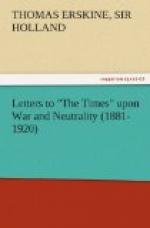The arbitrary treatment, in some instances, of American productions in Turkey has attracted attention of late, notably in regard to our flour. Large shipments by the recently opened direct steamship line to Turkish ports have been denied entrance on the score that, although of standard composition and unquestioned purity, the flour was pernicious to health because of deficient “elasticity” as indicated by antiquated and untrustworthy tests. Upon due protest by the American minister, and it appearing that the act was a virtual discrimination against our product, the shipments in question were admitted. In these, as in all instances, wherever occurring, when American products may be subjected in a foreign country, upon specious pretexts, to discrimination compared with the like products of another country, this Government will use its earnest efforts to secure fair and equal treatment for its citizens and their goods. Failing this, it will not hesitate to apply whatever corrective may be provided by the statutes.
* * * * *
The International Commission of Arbitration, appointed under the Anglo-Venezuelan treaty of 1897, rendered an award on October 3 last, whereby the boundary line between Venezuela and British Guiana is determined, thus ending a controversy which has existed for the greater part of the century. The award, as to which the arbitrators were unanimous, while not meeting the extreme contention of either party, gives to Great Britain a large share of the interior territory in dispute and to Venezuela the entire mouth of the Orinoco, including Barima Point and the Caribbean littoral for some distance to the eastward. The decision appears to be equally satisfactory to both parties.
Venezuela has once more undergone a revolution. The insurgents, under General Castro, after a sanguinary engagement in which they suffered much loss, rallied in the mountainous interior and advanced toward the capital. The bulk of the army having sided with the movement, President Andrade quitted Caracas, where General Castro set up a provisional government with which our minister and the representatives of other powers entered into diplomatic relations on the 20th of November, 1899.
* * * * *




